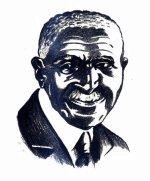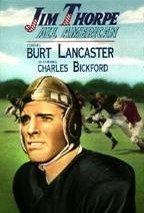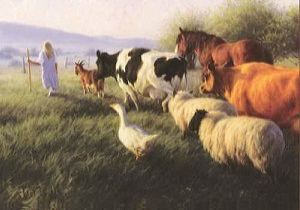Western Life - Influences
When a man has four children, and when those
children have known a measure of freedom in both city and country, and when
the man suddenly awakens to the fact that it is far easier to build the
sound body than the sound mind, and when he looks about him for guidance in
mind-building and sees so many bidding him to go this way and that by all
sorts of straight and narrow roads, then it comes as a great relief to
discover that there is a Mind of the Race based on wide and long
experience, which Mind of the Race is stored up in Literature....so far so
good?
Then comes the realization that literature is
vast concerning thought and intelligence and that which is merely
emotional. How then may man find the first, enjoy the latter not fall into
narrow divisions as age progresses and interests change? By nurturing new
friendships, embracing tested and true old friendships and keeping an open
mind to the hopes and dreams of all mankind.
Friendships may be summed up for this writer
as "western life." Not just the old west of frontier days,
but including high ideals which benefit mankind, our family and nourish our
mind and heart. Now you may explore some of the influences in this writers
life and how people, places and events hopefully prepared him for life
after death and enabled him to enjoy the "small things" of our
short existence on mother earth.
Johnny Appleseed
 John
Chapman, born September 28, 1774, died March 18, 1845, was known as Johnny
Appleseed throughout the Northwest Territory where he planted apple seeds. Today
known as the states of Ohio, Michigan, Indiana and Illinois. Popularized in word
and song, made a legend through stories laced with fact and fiction, he was also
well known and widely admired by children who grew up during and after the WWII.
John
Chapman, born September 28, 1774, died March 18, 1845, was known as Johnny
Appleseed throughout the Northwest Territory where he planted apple seeds. Today
known as the states of Ohio, Michigan, Indiana and Illinois. Popularized in word
and song, made a legend through stories laced with fact and fiction, he was also
well known and widely admired by children who grew up during and after the WWII.
John was a "boys boy" because his house was
literally on his back, for he never had a home in the traditional sense of
the word, but he was no mere dreamy wanderer, often traveling bare foot
ahead of the westward migrants and planted his nurseries before the
refugees arrived. The record on Johnny Appleseed reveals him to be a
careful, organized and strategic businessman who, over a period of several
decades, bought and sold many dozen tracts of land in advance of the
frontier expansion, and who developed countless thousands of productive
apple trees throughout the upper Midwest.
Johnny made friends with many of the Indian tribes and was
known to have learned many Indian languages well enough to converse.
Memories from settlers who know Johnny well indicate the impression that
many Indians held Johnny in high regard, and that his unusual zeal for
serving others led some to believe he was touched by the Great Spirit.
What made Johnny legendary is that he stayed itinerant his
entire life, his ability to exist harmoniously with Indian cultures as well
as his own; his colorful personal habits; living on foods provided by
nature, never killing animals; and according to his acquaintances with skin
so thick on his feet that it would kill a rattlesnake to try to bite
Johnny's feet.
John Chapman lived in complete harmony with nature.
In field and meadow and forest, he walked, concerned with the spacious
thought of God. The singularity of his thinking and his living was
inextricably entwined with his religious views of Swedenborgian spiritual
growth which was also embraced by Helen Keller and influenced Ralph Waldo
Emerson and William James.
Lessons Learned and Applied From Johnny
Appleseed
-
Planted first tree in the fourth
grade at Westlawn school in Mobile, Alabama
-
Participated in Arbor Day every
year from 1950 through to date.
-
Active participant and adult leader
in the Boy Scouts of America with particular emphasis on the
outdoor code and high adventure camping.
-
Established the Youth Conservation
Committee of the Soil and Water Conservation Service in Mobile
County, Alabama in the aftermath of hurricane Frederick, planting
thousands of trees and collecting seeds for propagation in
Alabama state nurseries.
George Washington Carver
 One
Christmas at about age 6 a chemistry set was carefully pulled from under
the tree along with a little book, Ten Boys Who Became Famous, by
Basil Miller. God's ebony scientist was born in 1864 and died January
5, 1943. The color of Dr. Carver's skin was of no concern to a six year
old, but delight in the fact of him teaching at Tuskegee Institute in
Alabama, my home state from age 4 until to day. His work with two lowly
southern crops, the sweet potato and the peanut are among the great
scientific achievements of my life time, but the little facts of his life
are what have truly inspired and lent me encouragement. Carver was
convinced that the key to his success was, "In all thy ways
acknowledge him, and he shall direct thy paths."
One
Christmas at about age 6 a chemistry set was carefully pulled from under
the tree along with a little book, Ten Boys Who Became Famous, by
Basil Miller. God's ebony scientist was born in 1864 and died January
5, 1943. The color of Dr. Carver's skin was of no concern to a six year
old, but delight in the fact of him teaching at Tuskegee Institute in
Alabama, my home state from age 4 until to day. His work with two lowly
southern crops, the sweet potato and the peanut are among the great
scientific achievements of my life time, but the little facts of his life
are what have truly inspired and lent me encouragement. Carver was
convinced that the key to his success was, "In all thy ways
acknowledge him, and he shall direct thy paths."
During his many years of his work at the Institute he
taught a Sunday school class, or, as he called it, a "Bible
class," where he often indicated the correlation of science and the
Bible, and clearly demonstrated the scientific nature and the truth of the
Genesis account of creation. He believed that the Creator worked with him,
revealing to him the secrets of nature and showing him how to unlock the
treasures of common things. On his desk in the Carver Museum lies the
small Bible which he carried for more than fifty years.
He received many attractive offers, but he chose to remain
at Tuskegee. Honors came to him. He was elected to noted societies,
received special degrees, and famous people the world around visited
him. He was busy to the end of his life.
The night the world was shocked to learn that George
Washington Carver, the slave lad who had been traded for a race horse, had
died. He was buried in a quiet spot among the green hills of Tuskegee, near
the little chapel where he had worshiped for many years.
Lessons Learned and Applied From
George Washington Carver
-
Men and women of God are created
equal in his eyes and he loves us, one and all.
-
Take time from the busy schedules
of daily life to seek understanding and harmony with nature in
God's handiwork.
-
Alabama and the world are better
places to live because of George Washington Carver
-
Daily Bible reading is a
joy...Thank you Dr. Carver for showing the way.
-
Thinking that this writer would
also gain knowledge of "little secrets" like Dr.
Carver, there has been no disappointment.
James Francis Thorpe (Jim)
 Another
little book under the Christmas tree, Jim Thorpe-Indian, by Van
Riper, Jr 1956 after seeing the movie which stared Burt
Lancaster. When folk ask if we are kin, a smile is always
kindled. All Lancasters are related, some more distant than others.
Born 1888, died 1953. Most people know that Jim won the decathlon and
pentathlon in the 1912 Summer Olympics in Stockholm, Sweden, but what a lot
of people do not know is that he was voted the first president of the
American Professional Football Association. This was the forerunner of
today's National Football League and that he was named to both the college
and professional football halls of fame. The semi-pro baseball team which
Jim Thorpe occasionally played for was made up of several other Sac and Fox
Indians.
Another
little book under the Christmas tree, Jim Thorpe-Indian, by Van
Riper, Jr 1956 after seeing the movie which stared Burt
Lancaster. When folk ask if we are kin, a smile is always
kindled. All Lancasters are related, some more distant than others.
Born 1888, died 1953. Most people know that Jim won the decathlon and
pentathlon in the 1912 Summer Olympics in Stockholm, Sweden, but what a lot
of people do not know is that he was voted the first president of the
American Professional Football Association. This was the forerunner of
today's National Football League and that he was named to both the college
and professional football halls of fame. The semi-pro baseball team which
Jim Thorpe occasionally played for was made up of several other Sac and Fox
Indians.
Most folk also know that Jim was stripped of
his Olympic medals and the Olympic Committee was forced to legitimize this
racially motivated precedent by concocting a Byzantine rule system that
denied U. S. athletes support while foreign governments were free to
support their athletes. The medals eventually were returned when it
was realized that baseball was not an Olympic sport.
On a lighter note and from an inscription in
our "little book" the following. "There is mention of the
game between Carlisle and West Point where Ike (future president) was told
to "stop that Indian!"...and was promptly run over."
Lessons Learned and Applied From Jim
Thorpe
-
We honestly had rather try, then
fail, than not to try at all.
-
Distance running became a passion,
though never excelling, always a picture of a childhood hero
running along side me and smiling. Now we fast walk and Jim
Thorpe is still with us.
-
Even a "little school"
like Carlisle can and will produce greatness, all because of
those who teach and truly care.
Our Western Life Founders and Members
Within the pages of Western Life Org are
living hero's and heroine's who have been apart of our life for the past
few years. They have given help, guidance, understanding and words of
encouragement to try and write poetry, live life each and every day to its
fullest and most of all friendship and memories which shall not tarnish nor
dim with time.
Remembering the Farm Community of Heartland
too!

Next Page
E
Mail
Sign
My Guestbook View
My Guestbook
View
My Guestbook
 One
Christmas at about age 6 a chemistry set was carefully pulled from under
the tree along with a little book, Ten Boys Who Became Famous, by
Basil Miller. God's ebony scientist was born in 1864 and died January
5, 1943. The color of Dr. Carver's skin was of no concern to a six year
old, but delight in the fact of him teaching at Tuskegee Institute in
Alabama, my home state from age 4 until to day. His work with two lowly
southern crops, the sweet potato and the peanut are among the great
scientific achievements of my life time, but the little facts of his life
are what have truly inspired and lent me encouragement. Carver was
convinced that the key to his success was, "In all thy ways
acknowledge him, and he shall direct thy paths."
One
Christmas at about age 6 a chemistry set was carefully pulled from under
the tree along with a little book, Ten Boys Who Became Famous, by
Basil Miller. God's ebony scientist was born in 1864 and died January
5, 1943. The color of Dr. Carver's skin was of no concern to a six year
old, but delight in the fact of him teaching at Tuskegee Institute in
Alabama, my home state from age 4 until to day. His work with two lowly
southern crops, the sweet potato and the peanut are among the great
scientific achievements of my life time, but the little facts of his life
are what have truly inspired and lent me encouragement. Carver was
convinced that the key to his success was, "In all thy ways
acknowledge him, and he shall direct thy paths." John
Chapman, born September 28, 1774, died March 18, 1845, was known as Johnny
Appleseed throughout the Northwest Territory where he planted apple seeds. Today
known as the states of Ohio, Michigan, Indiana and Illinois. Popularized in word
and song, made a legend through stories laced with fact and fiction, he was also
well known and widely admired by children who grew up during and after the WWII.
John
Chapman, born September 28, 1774, died March 18, 1845, was known as Johnny
Appleseed throughout the Northwest Territory where he planted apple seeds. Today
known as the states of Ohio, Michigan, Indiana and Illinois. Popularized in word
and song, made a legend through stories laced with fact and fiction, he was also
well known and widely admired by children who grew up during and after the WWII.
 Another
little book under the Christmas tree, Jim Thorpe-Indian, by Van
Riper, Jr 1956 after seeing the movie which stared Burt
Lancaster. When folk ask if we are kin, a smile is always
kindled. All Lancasters are related, some more distant than others.
Born 1888, died 1953. Most people know that Jim won the decathlon and
pentathlon in the 1912 Summer Olympics in Stockholm, Sweden, but what a lot
of people do not know is that he was voted the first president of the
American Professional Football Association. This was the forerunner of
today's National Football League and that he was named to both the college
and professional football halls of fame. The semi-pro baseball team which
Jim Thorpe occasionally played for was made up of several other Sac and Fox
Indians.
Another
little book under the Christmas tree, Jim Thorpe-Indian, by Van
Riper, Jr 1956 after seeing the movie which stared Burt
Lancaster. When folk ask if we are kin, a smile is always
kindled. All Lancasters are related, some more distant than others.
Born 1888, died 1953. Most people know that Jim won the decathlon and
pentathlon in the 1912 Summer Olympics in Stockholm, Sweden, but what a lot
of people do not know is that he was voted the first president of the
American Professional Football Association. This was the forerunner of
today's National Football League and that he was named to both the college
and professional football halls of fame. The semi-pro baseball team which
Jim Thorpe occasionally played for was made up of several other Sac and Fox
Indians.